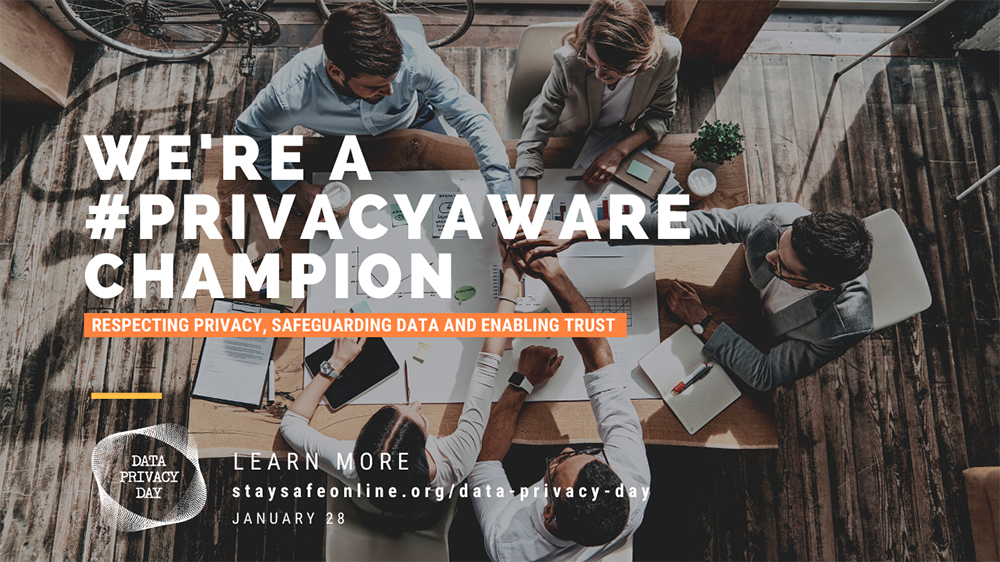You’re accessing archived content
This is archived content from the UIT website. Information may be outdated, and links may no longer function. Please contact stratcomm@it.utah.edu if you have any questions about archived content.
Data Privacy Day guest column: Be a champion of your own privacy

By Trevor Long, associate director of Governance, Risk & Compliance, Information Security Office
Privacy has become an expectation. When we share information on social media or shop online, there's an expectation that our correspondence, posts, and even our shopping habits and purchases will remain confidential.
That, however, may not always be the case. That's why it's important to be active participants in discussions and efforts regarding data privacy.
Since 2008, January 28 has been dedicated as Data Privacy Day. The date commemorates the January 28, 1981 signing of Convention 108, the first legally-binding international treaty dealing with privacy and data protection, according to Stay Safe Online. This year, the University of Utah participated as an official champion of the cause, which is to raise awareness about "the importance of privacy and protecting personal information."
The university is in a unique position to be a privacy champion. The U is an active community partner on a local, national, and global scale. In addition, the U is a recognized leader in many academic, research, and clinical disciplines. We are entrusted with a variety of data, some of which is personal and sensitive in nature. This means that the university can spread the message about protecting data privacy by setting an example. By becoming a champion, the U demonstrates its commitment to respecting and promoting the importance of privacy, and encourages others to do the same.
Efforts to protect data start with each of us. We all share a responsibility to respect the privacy of our students, patients, guests, faculty, and staff. One of the best resources available to you is the university's own statements regarding privacy, which can be accessed at https://www.utah.edu/privacy. Another helpful resource is the National Cyber Security Alliance (NCSA), which has created a helpful tool you can use to update your online privacy settings that covers online services, applications, mobile phones, and gaming devices.
Once you've started to improve your privacy settings, the next step is to share this information with others. For instance, you can use the hashtag #PrivacyAware to get the message out to a larger audience. In many instances, our friends, family, and associates are interested in privacy, but they don't know where to start. This is your chance to champion that effort and make a difference.
Creating a culture of privacy at home, in your community, and at work starts with you. Although Data Privacy Day is over, it's never too late to help raise awareness about the importance of data privacy.
For more information, visit https://staysafeonline.org. Resources and advocates also are available through the University of Utah's Information Privacy Office and Information Security Office.
What is the difference between privacy and security?
Security refers to the ways we protect ourselves, our property and personal information. It is the first level of defense against unwanted intruders. Privacy is our ability to control access to our personal information.
Data privacy tips
Your mobile devices — including smartphones, laptops and wearables — are always in reach wherever you go, and they share substantial information about you and your habits. Follow these basic privacy tips from the National Cyber Security Alliance (NCSA) to help you better manage your personal information.
- Personal info is like money: Value it. Protect it. Information about you, such as your purchase history or location, has value — just like money. Be thoughtful about who gets that information and how it’s collected through apps and websites. You should delete unused apps, keep others current and review app permissions.
- Share with care. Think before posting about yourself and others online. Consider what it reveals, who might see it and how it could be perceived now and in the future.
- Own your online presence. Set the privacy and security settings on websites and apps to your comfort level for information sharing. Each device, application or browser you use will have different features to limit how and with whom you share information.
- Think before you act. Information about you, such as the games you like to play, your contacts list, where you shop and your geographic location, has tremendous value. Be thoughtful about who gets that information and understand how it’s collected through websites and apps.
Node 4
Our monthly newsletter includes news from UIT and other campus/ University of Utah Health IT organizations, features about UIT employees, IT governance news, and various announcements and updates.
